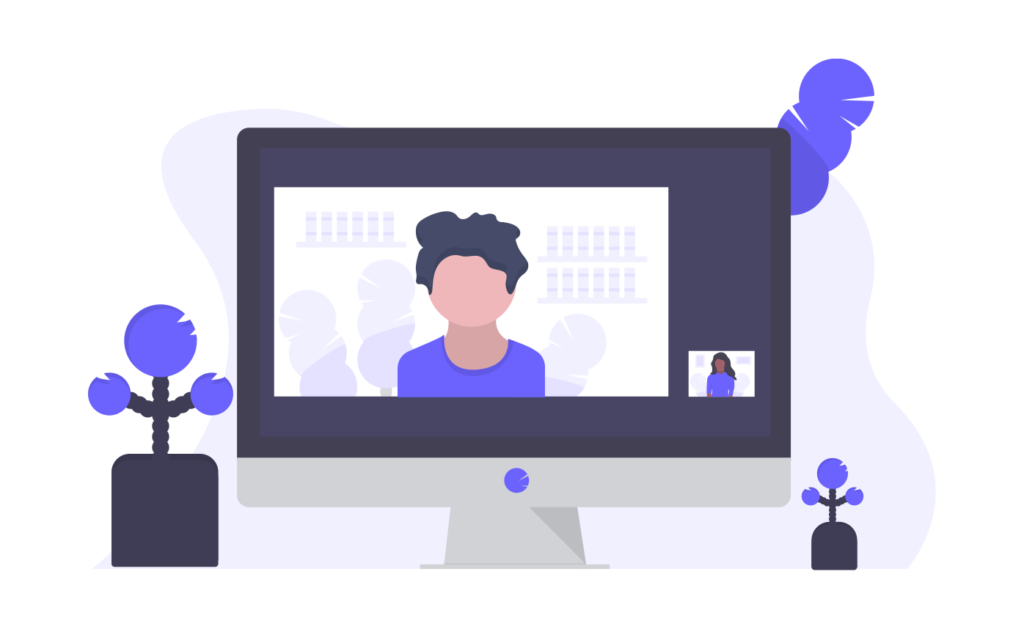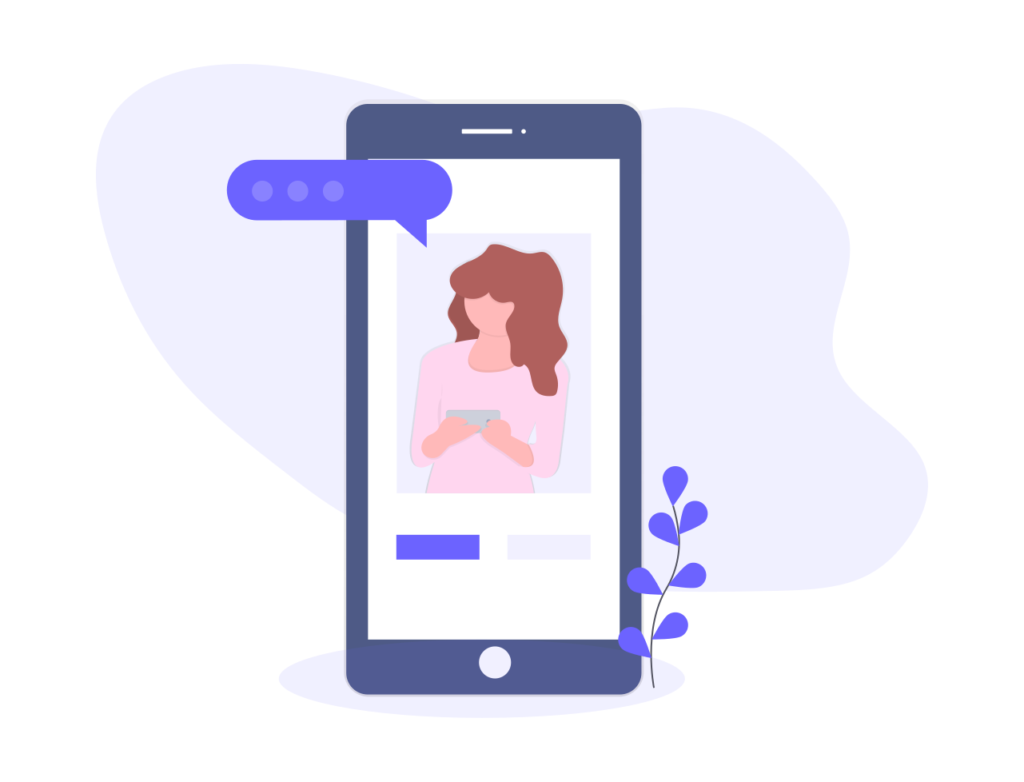We’ve all become more reliant on technology in recent years – for shopping, learning, socialising – pretty much every aspect of life. And therapy is another valuable service we can now access online, wherever and whenever suits us. But online therapy isn’t just for lockdowns. The benefits of online therapy are now widely recognised. So it’s here to stay – even after COVID.
The growth of online therapy is predicted to continue even post-pandemic. While lockdowns forced life – and therapy – online, research shows the benefits of a therapeutic video chat online. It’s as effective as in-person therapy, and comes with a whole host of additional benefits. These include the pragmatic such as convenience and cost – but also less obvious ones, to do with the therapeutic relationship.
So if you’re thinking about taking the plunge and wondering if it’s right for you, read on to learn more about the benefits of online therapy – and how you can get started.
What is online therapy?

Online therapy is exactly as it sounds. It’s just the same as in-person therapy: the only thing that changes is the setting.
Gone are the days when the only way to get mental health support was on a therapist’s couch. With the rise of online therapy, you can now speak to a qualified psychologist wherever and whenever suits you. The support you need is literally at your fingertips.
To say that technology has revolutionised our lives is an understatement. Our favourite Chinese takeaway can be on our plates with a few clicks of a button and a few swipes could be all it takes for us to find love. We’ve also become more used to online GP appointments during the pandemic. So it’s only natural that we want the same convenience and ease when it comes to looking after our mental health. After all, starting therapy takes guts. It’s a big enough step, without having to worry about bus timetables, childcare or social distancing.
Online therapy isn’t a new concept – it’s been around for a while now. But more and more of us have been seeing the benefits of online therapy lately, especially due to COVID. When tougher lockdown measures were in place, therapy sessions had to go digital and many clients found that virtual support invaluable. But there are lots of additional benefits beyond ease of access during a pandemic.
The collective trauma we’ve all experienced during the pandemic also means the need for therapy is greater than ever. According to a 2021 study by the US Centers for Disease Control, there’s been a significant increase in anxiety and depression since the pandemic began. And that’s completely understandable. Although things are improving, research also shows that the mental health consequences of the pandemic may be getting worse as things drag on, and as we struggle with pandemic fatigue.
Whether you want to alleviate your anxieties, face a phobia or simply become a better you, online therapy lets you access all the same coping mechanisms that you would in an in-person session. A senior psychologist will guide you along the right track using therapies such as Cognitive Behavioural Therapy (CBT), Schema Therapy or Dialectical Behavioural Therapy (DBT). But they’ll just do so via your phone, tablet or laptop.
7 benefits of online therapy
There are lots of advantages to connecting with a therapist online – both pragmatic and emotional. For many of us, taking the leap and starting therapy may be a little daunting. You might feel more comfortable having a video call with your therapist while your dog is nuzzled up by your feet. Or perhaps there aren’t enough hours in the day to dash to your therapist’s office between work and picking up the kids from school.
With advantages including accessibility, cost, time, privacy – it’s unsurpising that more and more of us are turning to the web for support. And you don’t even need to be too digital-savvy to get started. Some of the key benefits of online therapy include:
- Accessibility. There are plenty of physical barriers to accessing in-person therapy. You may live in a rural location, or not drive. If you have a physical disability, trudging across the city might be a bit of a nightmare. Or leaving your bed might just seem near-impossible when you’re feeling low. Online therapy helps sweep these geographic hurdles aside. Distance is no longer a barrier because there’s someone ready and waiting to help you at the click of a button – right there on your phone, tablet or laptop.
- Time. In our hectic lives, ‘me time’ can be hard to come by. You might have a frantic schedule and work irregular hours. Or perhaps you’re a single parent or a carer who’s always racing against the clock. Online therapy fits around your schedule, so you can chat to a therapist whenever and wherever suits you – whether that’s a quick video call squeezed in before your morning commute or a handy live messenger chat just before putting the kids to bed. It’s important that we make sure our minds are ticking along okay. And squeezing in a quick therapy session after dinner or just before our night shift could make all the difference.
- Privacy. Worried about bumping into a nosy neighbour in the waiting room? Or maybe you’d prefer chatting about how you’re feeling within the confines of your own home? For some, online therapy offers a comforting sense of privacy. Plus there are plenty of security measures in place to protect your privacy online – from high-grade encryption services to virus and password protection.
- Home comforts. Let’s face it: opening up and talking about how we’re really feeling can be tough. Really tough. But, sometimes, it’s the little things that make it easier. Some of us may feel more comfortable opening up online than in person. It may feel less daunting. Or perhaps you’d feel more at ease if you could snuggle up on your sofa with a cosy pair of bedroom slippers.
- Cost. The world would be a happier place if everyone could access therapy, not just a select few. If you’re strapped for cash and in-person therapy seems pricey, online therapy could be a good middle ground. It often provides greater flexibility: for example, you might be able to take advantage of shorter session times or live messenger therapy options that are just as effective but more affordable.
- Social distancing. COVID has taken a huge toll on our mental wellbeing. And if you’re already feeling nervous about meeting new people face to face, that’s one anxiety and barrier to therapy you can easily avoid. Though social distancing guidelines have eased in many jurisdictions, it’s still recommended in many places – and many of us are still reluctant to meet professionals in person when there’s another option. It may also simply be harder to book in-person appointments. Fortunately, none of these worries apply to online sessions. You still get the expert support you need. You can still put in the work and look after your mental health. But you can do so from the comfort (and safety) of your own home.
- Greater insights. Online therapy gives you the chance to show your therapist your home environment – which may provide useful clues for your therapy and treatment. Taking the conversation beyond the confines of a physical therapist’s office can breathe new energy and possibilities into the therapeutic process. In her book Unlocked: Online Therapy Stories, Anastasia Piatakhina Giré says: “…a curious and skilled online therapist can make the most of the unexpected gifts that ‘screen’ therapy offers – be it the intrusion of a pet, a parent breaking into the session or a client taking her therapist for a trip outside.”
Taking care of our minds is more important than ever. So if you’re thinking about taking the plunge, these are just a few reasons why online therapy could work for you. Find out more about how it works – and how you can get started with My Online Therapy.
Is online therapy effective?

But does it work? Yes. It really does. Online therapy is so much more than a chat on the phone. Research shows that online therapy is just as effective as in-person sessions.
Let’s take Cognitive Behavioural Therapy (CBT), for instance. You might have heard of it before because it’s an effective treatment when it comes to depression, anxiety disorders, eating disorders, panic, PTSD, bipolar disorder, psychosis and phobias (including agoraphobia and social phobia). Essentially, CBT is based on the idea that our thoughts, feelings, what we do and how our body feels are all interconnected.
Many studies have found online CBT to be at least as effective as in-person therapy for a range of mental health difficulties, including anxiety, depression and panic disorders. A 2018 study published in the Journal of Psychological Disorders found that online CBT was “equally effective as face-to-face CBT”. And a 2020 review of 17 studies found that online CBT for depression may actually be more effective than face-to-face therapy.
In many cases, it’s simply about finding the right therapist – someone who you can trust to guide you in the right direction. It can often be a case of trial-and-error. We’re all unique, which all means we’ve all got our own different issues we want to work on. But thankfully many practices allow you to switch therapists free of charge if it doesn’t feel right the first time around.
Ultimately, when it all boils down to it, real and lasting change starts and ends with you. It doesn’t matter if you start that journey in a therapist’s office or behind a computer screen, by putting in the legwork you’re taking the first step to becoming a healthier, happier you.
This is an update of a post that first appeared on this site on 16 Oct 2020.
